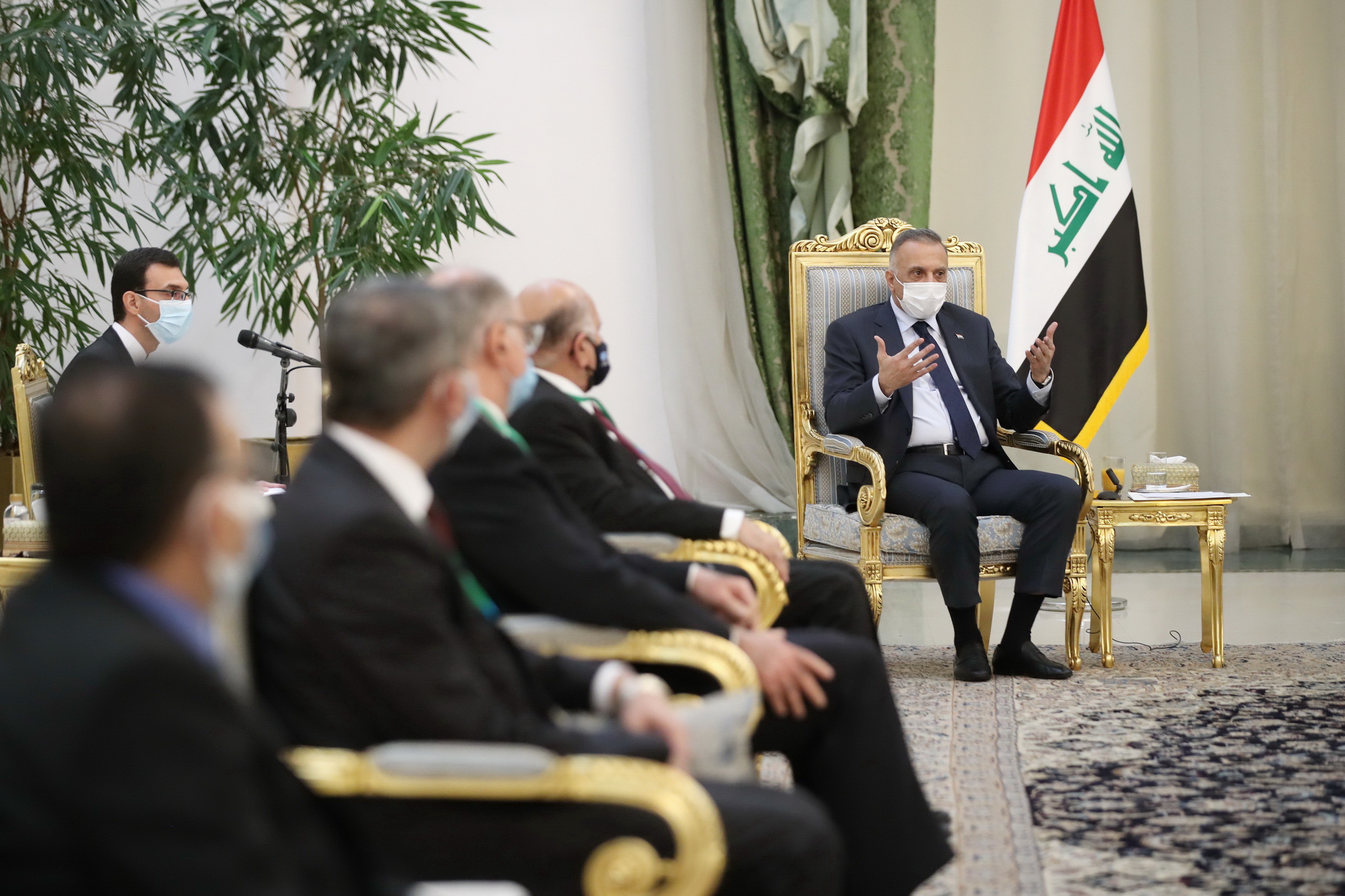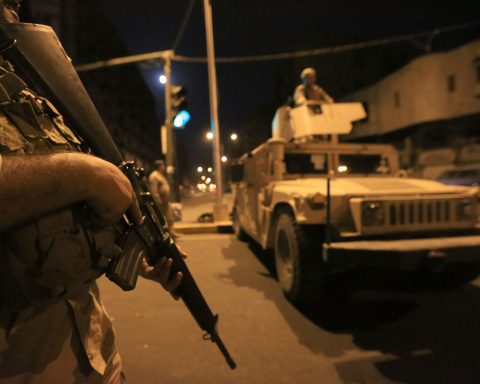Since taking office in May 2020, Iraqi Prime Minister Mustafa al-Kadhimi, who has been trying to consolidate his relations with the United States (US), European states, Iran, and Turkey, as well as Arab states such as Egypt and Jordan, has attached special importance to the Gulf states. Kadhimi wanted to make his first foreign visit to Saudi Arabia, but the visit was postponed due to the sudden illness of King Salman. The diplomatic visit between Kadhimi’s government and the Gulf Cooperation Council (GCC) states were conducted later, to Saudi Arabia on March 31, the United Arab Emirates (UAE) on April 4, and the contacts of Qatari Minister of Foreign Affairs, Mohammed bin Abdulrahman al-Thani, in Baghdad on March 24, to boost bilateral relations and trust. Considering the post-2003 US invasion, Iraq has always been the epicenter of the conflict between Iran and the GCC. What are the main motivations for Kadhimi’s desire to improve relations with the Gulf states?
After Saddam Hussein’s invasion of Kuwait in 1990, Iraq’s relations with the Gulf states could not develop normally due to the fall of Saddam in the 2003 US invasion, the subsequent sectarian tone of the Shiite leader Nouri al-Maliki’s governments, Iran’s relative reinforcement of hegemony in Iraq, and the rise of the terrorist organization Islamic State of Iraq and Syria (ISIS). The sectarian tendencies in politics and society in Iraq, which turned from being a regional power to a “failed state” after the US invasion, and the allegations that some Gulf-supported Sunni groups that involved terrorist organizations such as ISIS, also negatively affected Iraq-Gulf relations.
Adel Abdul-Mahdi, who came after Iraqi Prime Minister Haider al-Abadi, sought to normalize relations with the Gulf states, especially with Saudi Arabia, after Maliki’s term of office ended in 2014. Furthermore, he intensified his contacts with the regional states with the discourse of “balanced foreign policy” during his short tenure. In this context, Riyadh, which has severed diplomatic relations with Baghdad since the invasion of Kuwait, signaled its intention to return to Iraq after 2015, appointing an ambassador to Baghdad that year and opening its first consulate in Erbil the following year. The reopening of the Arar border crossing, which had been closed for nearly 30 years, negotiated during Abdul-Mahdi’s term, but opened in Kadhimi’s, is a clear sign for the Riyadh-Baghdad normalization. Considering that Riyadh is the flagship of the Gulf, this has been an opening process for the entire region.
Actor diversification in foreign policy
Inheriting a heavy political, economic, social, and diplomatic legacy in Iraq, Kadhimi’s foreign policy focuses on actor diversification as a way to support Iraq’s interests. Calling the talks on the Iraq-Egypt-Jordan line “The New Levant” initiative, Kadhimi is attempting to repair the country’s negative international image while maintaining balance without relying on a small number of foreign policy actors by increasing his contacts with Gulf states. Kadhimi, who is eager to limit the hegemony of Iran – which gained power from the roles of Shiite politicians and militias after the US invasion – wants to bring the Gulf states into the equation to balance and limit Iran’s influence as they would also want the same, due to the tense relations that most of the GCC states have with Iran. Given that the Saudi Royal Palace was targeted by a drone attack carried out by an Iranian-backed militia group on Iraqi soil on January 23, Kadhimi’s statement that Iraq will not be used as a base for attacks against Saudi Arabia reflects widespread dissatisfaction from Iranian activities in Iraq. On the other hand, Iraq’s rapprochement with Saudi Arabia and the UAE, which have strong relations with the US, and the fact that the UAE’s normalization process with Israel brings a security dimension to Baghdad-Abu Dhabi relations alarmed Iran.
It is considered that Kadhimi wants to include regional powers in the Iraqi equation in order to minimize the damage that his country will suffer from the proxy war between the US and Iran, by diversifying actors. In addition, it is noteworthy that Iraq played a mediating role in the region in a process where the third round of the strategic dialogue talks with the US was held. Saudi Arabia, which supports the decision to impose sanctions on Iran and is disturbed by Iran-backed proxy forces in addition to its nuclear missile program, held a high-level meeting with Iran, which is waging a proxy war in Yemen, for the first time on April 9, 2021, in Baghdad. The fact that the meeting, which is related to US President Joe Biden’s signs of change in its Iran policy and his pressure to end the war in Yemen, took place in Baghdad after Kadhimi’s visit to Saudi Arabia indicates that Iraq’s new foreign policy initiatives are successful.
Efforts to strengthen the economy
According to Transparency International’s Corruption Perceptions Index, Iraq ranks 160th out of 180 countries, having lost nearly $450 billion in public funds since 2004. Again, in a country where youth unemployment has doubled the general unemployment figures and reached 35%, the long-standing wrong economic policies, the destruction left by ISIS, and the recent deepening of economic problems due to the COVID-19 pandemic and the decrease in oil prices brought in new searches. In this sense, Iraq, whose government’s debt exceeds 150 billion dollars, attaches importance to the Gulf in its foreign policy to provide economic input.
As a matter of fact, considering Kadhimi received an investment promise of approximately $6 billion during his visit to Saudi Arabia and the UAE, the relationship between the economy and foreign political balance is understood. On the other hand, the decision to establish a business council between the two countries during Kadhimi’s visit to the UAE is a clue that economic relations will be strengthened. In Iraq, where the small Gulf states entered in the context of economic relations before Saudi Arabia, the companies of the UAE, for instance, which planned to start direct flights with Iraq on May 1, have almost $30 billion investment in the country. At the International Conference for Reconstruction of Iraq hosted by Kuwait, which also played a mediating role between the Gulf states and Iraq, the participants promised $30 billion in loans or investments. However, on March 15, when Qais al-Khazali, the leader of the pro-Iranian Shiite militia group Asa’ib Ahl al-Haq, claimed that a team from the UAE was leading Iraq’s intelligence service, it showed the discomfort that Kazimi’s relations with the Gulf had created for the Iran-backed militia groups because the investments reduced the perception of insecurity in the country and provided services and job opportunities for Iraqi citizens, which may help limit the militia-induced instability in Iraq.
On the other hand, Iraq, which supplies a significant part of its electricity needs to Iran, wants to diversify its dependence on energy as it wants to prevent the use of energy as leverage due to political tensions. As a matter of fact, Iraq, which is in search of alternative sources due to the US’ discomfort with its energy dependence on Iran, aims to balance Iran’s economic pressure by developing a project to establish a power line with the GCC states.
Relieving Domestic Policy
Kadhimi’s contacts with Gulf states have both domestic and foreign policy motivations. Because the Sunni society of the country is excluded by sectarian policies, social psychology has become fragile after ISIS. The tensions in politics and the lack of control of the pro-Iran militias put the administrators in a deadlock in domestic politics. The protest movement, which demanded the resignation of the government due to motivations such as corruption and unemployment in October 2019, has caused Prime Minister Abdul-Mahdi to resign. Therefore, it can be said that Kadhimi tried to relieve the current deadlock in domestic politics with foreign policy initiatives.
During Pope Francis’ visit to Iraq in March, the Sunni neglection claims re-emerged as the Pope met with Ayatollah Ali al-Sistani – the highest religious authority of the Shiites in Iraq – but had no sufficient contacts with the Sunnis. However, in the second week of March, Kadhimi sent a letter of invitation to Iraq to the Grand Sheikh of al-Azhar, Ahmed al-Tayeb, in Egypt. Also, he intensified diplomatic tours to the Sunni and Gulf states, which supported the reconstruction of structures such as the al-Hadba Minaret and the Great Nuri Mosque in Mosul. Kadhimi’s steps have been interpreted as a non-sectarian foreign policy embracing the Sunni society.
On the other hand, if it is evaluated that the prominence of Arab identity in the contacts with the Gulf countries aim to prevent the sectarian emphasis in Iraq, this turns into a useful argument for Kadhimi in domestic politics. Thus, by emphasizing the Arab identity, Kadhimi’s hand will be strengthened in both attracting the Sunnis and hindering the sectarian policies of the pro-Iran militias. In addition, he gives a message to the protesters who emphasize “Iraqiness” by associating his talks with all actors in the region with the same emphasis on the discourse of ‘sovereignty’.
Despite Kadhimi’s efforts and the unpredictable normalization talks between Riyadh and Tehran, there is a possibility that a rapprochement with the Gulf will turn Iraq into an area of Iran-Gulf tension. Although the anti-Iranian approach in Iraq provides advantages for the Gulf states, Tehran’s ideological base, bureaucracy, militia forces, and the presence of political groups close to it in the parliament in Iraq have the capacity to limit the Gulf’s influence in Iraq in the medium term.
Considering Iran’s political weight in Iraq, the position of the Gulf states in Iraq’s upcoming general elections may cause tension. As a result, the possibility that Kadhimi and his new allies, who want to limit Iran’s influence in the election process, may encounter pro-Iran militias should not be ignored. On the other hand, the post-election scene of Iran that emerges may aid the Gulf states’ pursuit of breaking Iran’s influence in Iraq through their political and economic presence.













